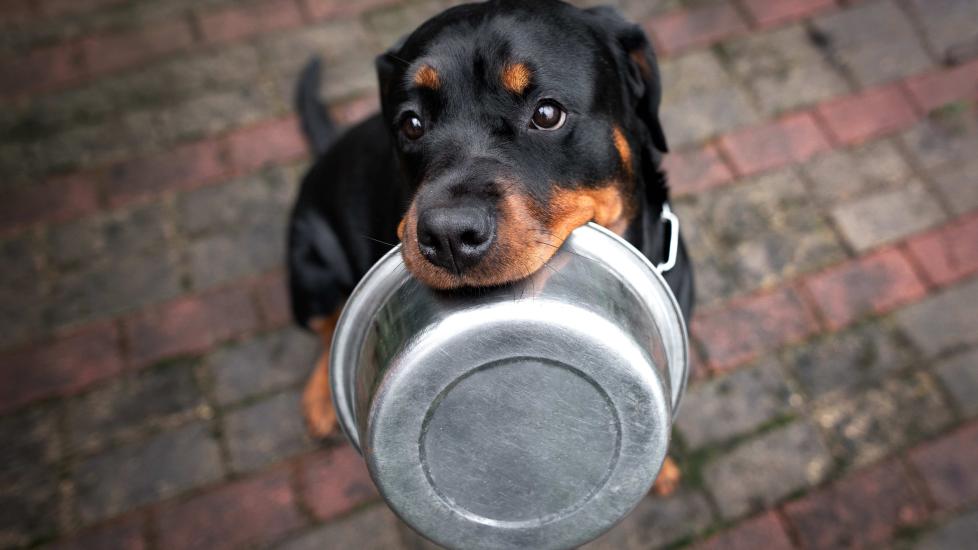Can Dogs Eat Kiwi?
NOTE: Always check with your veterinarian first before giving your dog any new foods, especially “people foods.” What might be OK for one dog might not be good for your dog, depending on multiple factors, such as their age, health history, health conditions, and diet. Dogs on prescription diets should not be fed any food or treats outside the diet.
It might not be the first healthy treat that pops into your mind, but any dog parent who has a pooch with a hearty appetite (and a penchant for begging) can find themselves asking if their dog can share whatever snack they're having. The fuzzy-skinned, tart green kiwifruit is no exception.
If you've found yourself wondering, “can dogs eat kiwi?” the answer is yes! Dogs can have peeled, diced kiwi in small amounts.
But while kiwifruit is not considered toxic to dogs, there are a few precautions to take before feeding Fido this little fruit. Keep reading to learn more about how much kiwi is safe for dogs to consume, plus what nutritional benefits and health risks you should know about.
Is Kiwi Good For Dogs?
Kiwifruit is considered a "nutrient-dense fruit," and is a great source of vitamin C, fiber, and potassium—three nutrients that should be included in your dog’s diet. Kiwi is also known for being high in fiber and water content, so some nutrition experts recommend the fruit to humans as a natural remedy for issues like constipation. But that also means that eating too much kiwi could cause upset stomach or diarrhea. The same applies to dogs who eat kiwi, but sticking to small portions should help alleviate the risk.
Kiwi is not toxic to dogs and can be a safe snack when given on occasion and in small amounts. But if your dog has a sensitive stomach or is prone to digestive issues, it may be best to avoid feeding them kiwi. Additionally, the high sugar content can be a risk for dogs with diabetes, since it may cause blood sugar spikes.
As with any new food, it's always best to ask your veterinarian before adding kiwi to your dog's diet. They can provide you with personalized advice on what foods are safe and healthy for your furry friend, especially if they have health issues.
Can Dogs Eat Kiwi Skin?
Always peel the kiwi before feeding it to your dog to minimize the risk of choking or digestive issues. Kiwi skin is not toxic to dogs, but it can be difficult to digest. While the skin itself is not likely to become a choking hazard (unless they swallow the fruit whole), it’s considered roughage and may cause your dog to experience gas or other digestive discomfort.
As you peel the kiwi, cut it into small bites for your dog. Never let your dog eat a kiwi without cutting it into smaller pieces. Swallowing a whole kiwi could cause your dog to choke or even create an intestinal blockage.
Can Dogs Eat Kiwi Seeds?
Similar to the skin, kiwi seeds are not toxic to dogs. The tiny black seeds found inside the kiwi are also small enough that they should not cause choking hazards or intestinal blockages. It’s fine for your dog to eat the seeds along with the kiwifruit.
How to Prep Kiwi for Dogs
To prepare kiwi for your dog, start by washing the fruit thoroughly to remove any dirt or pesticides. Next, peel the kiwi skin off so that only the meat of the fruit is left. Dice the fruit into small, bite-sized pieces to reduce the risk of choking.
How Much Kiwi Can Dogs Eat?
Try feeding your pooch a small bite at first. Even if they love their first taste of kiwi, go slow—too much at once could cause an upset stomach. A few small bites should be OK as an occasional treat, but as with any new food, watch for digestive upset and stop feeding if your dog appears unwell after eating kiwi.
Here are some general portion guidelines to follow if you’re introducing kiwi to a healthy, adult dog:
-
Extra-small dog (2–20 pounds) = One or two small pieces (about 1 teaspoon’s worth)
-
Examples: Yorkies, Chihuahuas, Pomeranians, Pugs
-
-
Small dog (21–30 pounds) = Up to four teaspoon-sized pieces
-
Medium dog (3–-50 pounds) = Up to six teaspoon-sized pieces
-
Examples: Basset Hounds, Border Collies, Australian Cattle Dogs
-
-
Large dog (51–90 pounds) = Up to eight teaspoon-sized pieces
-
Examples: Pit Bulls, German Shepherds, Labrador Retrievers, Australian Shepherds
-
-
Extra-large dog (91+ pounds) = 10 teaspoon-sized pieces or less
-
Examples: Newfoundlands, Bernese Mountain Dogs, Saint Bernards, Great Pyrenees
-
What Other Fruits Can Dogs Eat?
Generally speaking, the following fruits are safe for dogs to eat. As with any new food—even the safe, healthy kinds—introduce fruit to your dog’s diet in moderation and watch for any signs of digestive upset.
Remember that not all fruit is safe for dogs to eat. Some fruits, like grapes, should be avoided because they are toxic to dogs. Always talk to your vet before introducing new foods to your dog's bowl, as they may have recommendations that take into account your pet’s health, age, and weight.
Featured Image: Adobe/otsphoto
